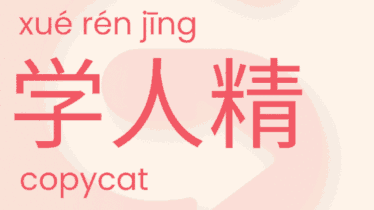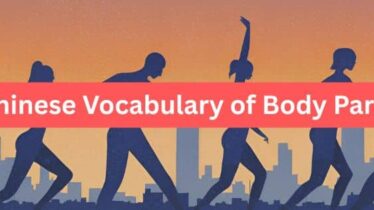Different ways to say “Eye” in Chinese
We all know how important our eyes are, right? Well, in Chinese culture and language, they hold a special place too! let’s get started and discover how to talk about eyes in Chinese.
眼睛 (yǎnjing) – The most common and widely used term for “eye” in Chinese
“眼睛” (yǎnjing) is the most common way to say “eye” in Chinese. It’s a straightforward and widely used term that you’ll encounter in various contexts.
Conversation 1:
A: 你的眼睛很漂亮!(Nǐ de yǎnjing hěn piàoliang!) – Your eyes are beautiful!
B: 谢谢!(Xièxie!) – Thank you!
Conversation 2:
A: 看见我的眼睛了吗?(Kànjiàn wǒ de yǎnjing le ma?) – Did you see my eyes?
B: 看见了,非常明亮!(Kànjiàn le, fēicháng míngliàng!) – Yes, they’re very bright!
Conversation 3:
A: 你的眼睛红了,怎么了?(Nǐ de yǎnjing hóng le, zěnme le?) – Your eyes are red, what happened?
B: 我刚哭过,有点难过。(Wǒ gāng kū guò, yǒudiǎn nánguò.) – I just cried, feeling a bit sad.
目 (mù) – A more formal and literary term for “eye” in Chinese
“目” (mù) is a formal and literary term for “eye” in Chinese. While it may not be as commonly used as “眼睛” (yǎnjing), it adds a touch of elegance and sophistication to your vocabulary.
Conversation 1:
A: 你的目光真有力量。(Nǐ de mùguāng zhēn yǒu lìliang.) – Your gaze is truly powerful.
B: 谢谢夸奖。(Xièxie kuājiǎng.) – Thank you for the compliment.
Conversation 2:
A: 你有没有注意到他的目光不对劲?(Nǐ yǒu méiyǒu zhùyì dào tā de mùguāng bù duìjìn?) – Have you noticed that something is off with his gaze?
B: 是的,他看起来有些迷茫。(Shì de, tā kàn qǐlái yǒuxiē mímáng.) – Yes, he seems a bit lost.
Remember, incorporating “目” (mù) into conversations can convey a more refined and sophisticated tone, suitable for specific situations where a touch of elegance is desired.
眸子” (móuzi) – colloquial term for “eye”
“眸子” (móuzi) is an informal and colloquial term for “eye” in Chinese. It carries a sense of familiarity and can be used in more relaxed and casual conversations.
Conversation 1:
A: 你的眸子好有神。(Nǐ de móuzi hǎo yǒu shén.) – Your eyes are so lively.
B: 谢谢夸奖。(Xièxie kuājiǎng.) – Thank you for the compliment.
Conversation 2:
A: 瞧瞧他的眸子,好迷人。(Qiáo qiáo tā de móuzi, hǎo mírén.) – Look at his eyes, so charming.
B: 是的,真的很迷人。(Shì de, zhēn de hěn mírén.) – Yes, they’re really captivating.
Conversation 3:
A: 你的眸子里有一种特别的光芒。(Nǐ de móuzi lǐ yǒu yī zhǒng tèbié de guāngmáng.) – There’s a special sparkle in your eyes.
B: 哈哈,是吗?谢谢夸奖。(Hāhā, shì ma? Xièxie kuājiǎng.) – Haha, really? Thank you for the compliment.
Figurative Usage of 眼 and 目
眼光 (yǎnguāng) – Referring to a person’s insight or vision
“眼光” (yǎnguāng) refers to a person’s insight, vision, or judgment in Chinese. It describes the ability to perceive and evaluate situations or individuals.
Conversation 1:
A: 他的眼光很独特,总能发现潜力股。(Tā de yǎnguāng hěn dútè, zǒng néng fāxiàn qiánlì gǔ.) – His vision is unique; he always spots the potential stocks.
B: 是的,他的眼光确实犀利。(Shì de, tā de yǎnguāng quèshí xīlì.) – Yes, his judgment is indeed sharp.
Conversation 2:
A: 你对这个项目有什么眼光?(Nǐ duì zhè ge xiàngmù yǒu shénme yǎnguāng?) – What’s your vision for this project?
B: 我觉得这个项目很有发展潜力。(Wǒ juédé zhè ge xiàngmù hěn yǒu fāzhǎn qiánlì.) – I think this project has great potential for development.
眼神 (yǎnshén) – Referring to the expression or gaze in someone’s eyes
“眼神” (yǎnshén) refers to the expression or look in one’s eyes in Chinese. It captures the emotions, intentions, or messages conveyed through a person’s gaze.
Conversation 1:
A: 他的眼神充满了自信和决心。(Tā de yǎnshén chōngmǎn le zìxìn hé juéxīn.) – His eyes are filled with confidence and determination.
B: 是的,他看起来很有力量。(Shì de, tā kàn qǐlái hěn yǒu lìliang.) – Yes, he looks very powerful.
Conversation 2:
A: 你为什么不敢直视我的眼神?(Nǐ wèishénme bù gǎn zhíshì wǒ de yǎnshén?) – Why can’t you look me in the eye?
B: 我感到有些尴尬和内疚。(Wǒ gǎndào yǒuxiē gāngà hé nèijiù.) – I feel a bit awkward and guilty.
Specialized Terms
- 视网膜 (shìwǎngmó) – Referring to the retina
- 瞳孔 (tóngkǒng) – Referring to the pupil
- 睫毛 (jiémáo) – Referring to eyelashes
- 眉毛 (méimáo) – Referring to eyebrows
- 眼球 (yǎnqiú) – Referring to the eyeball
Idioms and Proverbs related to eyes in Chinese
-
一目了然 (yī mù liǎo rán)
“一目了然” (yī mù liǎo rán) is a Chinese idiom that means “clear at a glance” or “evident at first sight.” It describes a situation where something is immediately and easily understood.
Conversation: A: 你看这个图表,数据的变化一目了然。(Nǐ kàn zhè ge túbiǎo, shùjù de biànhuà yī mù liǎo rán.) – Look at this chart, the changes in the data are evident at a glance. B: 是的,这样一看就知道趋势了。(Shì de, zhèyàng yī kàn jiù zhīdào qūshì le.) – Yes, you can easily see the trend with just one look.
2. 眼高手低 (yǎn gāo shǒu dī)
“眼高手低” (yǎn gāo shǒu dī) is an idiom in Chinese that describes someone who has high expectations or ambitions but lacks the corresponding skills or abilities to match.
Conversation: A: 他总是想做很多事情,但结果总是不尽人意。(Tā zǒng shì xiǎng zuò hěn duō shìqíng, dàn jiéguǒ zǒng shì bù jìn rényì.) – He always wants to do many things, but the results are always unsatisfactory. B: 是啊,他有点眼高手低。(Shì a, tā yǒudiǎn yǎn gāo shǒu dī.) – Yes, he has high ambitions but lacks the necessary skills.
3.一叶障目,不见泰山 (yī yè zhàng mù, bù jiàn tài shān)
“一叶障目,不见泰山” (yī yè zhàng mù, bù jiàn tài shān) is an idiom in Chinese that describes the situation where a single leaf obscures the entire view, preventing one from seeing the grandeur or significance of Mount Tai.
Conversation: A: 他只关注小事情,却忽略了更重要的大局。(Tā zhǐ guānzhù xiǎo shìqíng, què hūlüè le gèng zhòngyào de dàjú.) – He only focuses on trivial matters and overlooks the bigger picture. B: 是的,他一叶障目,不见泰山。(Shì de, tā yī yè zhàng mù, bù jiàn tài shān.) – Yes, he is blinded by a single leaf and fails to see Mount Tai.
Don’t miss out on expanding your knowledge – visit our Chinese learning resource page!
Immerse yourself in an unforgettable learning experience! – Book a Trial Chinese Learning Class



